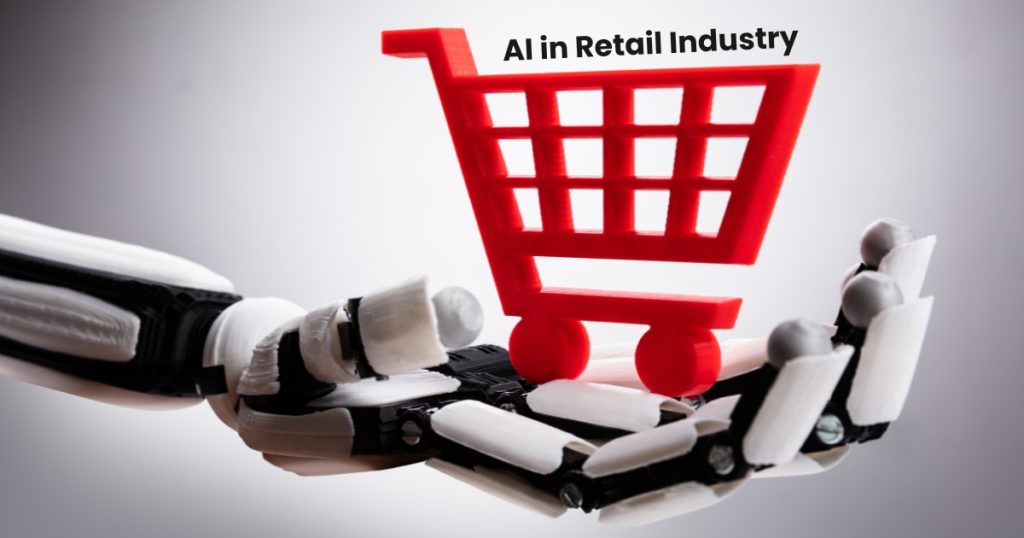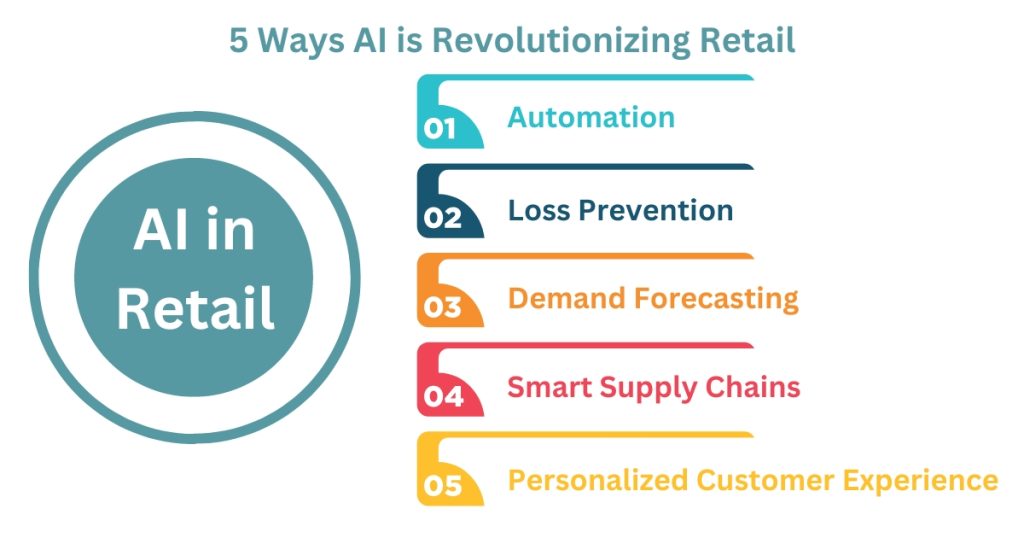Introduction
In today’s rapidly evolving retail landscape, staying ahead of the curve is essential for success. Retailers are accomplishing this, in part by utilizing artificial intelligence. Forget about the impersonal B2B sales environment; retail is driven by emotions. After spending days investigating, contrasting and perusing shoppers make an impulsive purchase of something else.
These emotional swings are relatable, they are challenging to quantify using conventional techniques. This is where AI enters the picture. By employing machine learning algorithms, AI enables merchants to comprehend customers and direct them toward making purchases more quickly. AI in retail transforms the way we buy from science fiction to everyday reality by providing genuine benefits to both online and offline contexts. This blog examines several AI technologies that are changing and expected to further transform the way we shop.

Understanding AI in Retail Industry
Fundamentally, artificial intelligence (AI) in retail involves leveraging advanced algorithms and data analytics to drive insights and decision-making.
For instance, depending on its customer’s browsing and purchase histories, the massive online retailer Amazon recommends things to them using AI-powered recommendation algorithms. AI algorithms are able to recognize patterns and preferences in massive volumes of data, which allows merchants to customize their products for specific clients.
Benefits:
- Improved customer experience: Personalization, recommendations, targeted marketing.
- Better decision-making: Data-driven insights, forecasting, demand prediction.
- Increased efficiency: Automation, optimization, reduced costs.
5 Ways AI is Revolutionizing Retail
1. Automation: From inventory management to supply chain optimization, AI automates tasks, freeing up resources and saving costs.
2. Loss Prevention: AI-powered systems combat theft and fraud, using computer vision to monitor activity and prevent losses.
3. Demand Forecasting: AI analyzes data to predict demand for specific products, ensuring shelves are always stocked and customers are satisfied.
4. Smart Supply Chains: AI optimizes supply chains, streamlining processes, minimizing waste, and adapting to changing conditions.
5. Personalized Customer Experience: AI personalizes the shopping experience, recommending relevant products and improving customer loyalty.
By embracing AI, retailers are creating a future of efficiency, agility, and customer satisfaction.

Personalizing Customer Experiences
One of the most significant benefits of AI in retail industry is its ability to personalize customer experiences.
Retail Meets AI: Personalized Offers On-the-Go
Forget generic ads, location-based services (LBS) paired with AI are transforming retail. Imagine walking by a store and receiving a personalized offer on your phone based on your past purchases and interests.
Here’s how it works:
- High-precision sensors in the store detect your phone’s location.
- AI analyzes your data, including purchase history and online activity (if you have the store’s app).
- Personalized promotions are sent to your phone, enticing you to enter and purchase relevant products.
This personalized approach fosters brand loyalty and increases sales by:
- Understanding customer preferences in real-time.
- Creating targeted offers that resonate with individual needs.
- Shifting customer attention away from competitors.
Take Netflix, for example. The streaming service uses AI algorithms to analyze viewers’ watch history and preferences, then recommends movies and TV shows tailored to each user’s tastes.
Similarly, clothing retailer Stitch Fix utilizes AI to curate personalized clothing selections for customers based on their style preferences and body measurements. AI tailors retail experiences for ultimate convenience and personalized shopping, driving satisfaction and loyalty.
Optimizing Inventory Management
AI also plays a crucial role in optimizing inventory management for retailers. By analyzing historical sales data, current trends, and external factors like weather patterns, AI algorithms can forecast demand with remarkable accuracy. This allows retailers to maintain optimal inventory levels, minimizing stockouts and excess inventory.
Walmart, for instance, employs AI-powered demand forecasting models to optimize its inventory across thousands of stores, resulting in significant cost savings and improved efficiency.
Benefits:
- Reduced stockouts
- minimized excess inventory
- Improved efficiency
- cost savings.
Automating Customer Service
Another area where AI is making waves in retail is customer service automation.
Chatbots, powered by AI algorithms, are increasingly being used by retailers to handle customer inquiries and provide assistance round-the-clock. These AI-driven chatbots can answer common questions, resolve issues, and even process orders, all without human intervention.
Retailers like Sephora and H&M have implemented chatbots on their websites and messaging platforms, enhancing the customer experience while reducing the workload on human customer service agents.
Benefits:
- 24/7 customer support
- faster issue resolution
- reduced workload for human agents.
Retail Revolution: Automated checkouts
Gone are the days of long checkout lines. The future of retail is here, and it’s automated.
Giants like Walmart are leading the charge with self-checkout kiosks, while others like Tesco and Amazon Go are pushing the boundaries with AI-powered, Cashierless stores.
These stores utilize cameras, sensors, and AI to track what customers pick up and automatically charge their accounts upon leaving.
This technology not only improves customer experience by eliminating queues, but also reduces operating costs for retailers. What started as a pilot project is now becoming accessible to businesses of all sizes thanks to companies like Trigo and SAP offering integrated AI and IoT solutions.
Enhancing Marketing Campaigns
AI is also revolutionizing marketing in the retail industry. By analyzing customer data and behavior, AI algorithms can identify target audiences, personalize marketing messages and optimize ad placements for maximum impact.
For example, online retailer ASOS utilizes AI to segment its customer base and deliver personalized email campaigns tailored to each segment’s preferences and browsing history. This targeted approach not only increases the effectiveness of marketing campaigns but also improves customer engagement and conversion rates.
Benefits:
- Targeted marketing
- personalized messaging
- improved campaign effectiveness
- increased customer engagement.
Overcoming Challenges
Despite its numerous benefits, AI adoption in retail comes with its own set of challenges.
- These include the high cost of implementation
- the need for skilled data scientists and engineers
- concerns about data privacy and security.
However, with proper planning, investment, and expertise, these challenges can be overcome, enabling retailers to fully leverage the power of AI to drive growth and innovation.
Real-World Examples of AI in Retail
- Amazon Go: Amazon’s cashier-less stores utilize AI-powered sensors and computer vision technology to track customers’ movements and purchases, enabling a seamless shopping experience without checkout lines.
- Nike: The sportswear giant utilizes AI to analyze customer data and trends, allowing it to design and customize products tailored to individual preferences and performance needs.
Retail embraces AI: Leaders dive deep, driving loyalty and sales
The retail industry and AI are becoming inseparable. Major players are doubling down on AI to personalize experiences, boost sales, and gain a competitive edge. Some, like Amazon and Sephora, have successfully woven AI into their core operations, reaping significant rewards.
Amazon: Pioneering AI, they personalize recommendations, predict demand, use voice assistants, and innovate in-store logistics.
Sephora: Partnering with AI solutions, they optimize inventory, manage promotions, and personalize recommendations through AR tools.
Looking Towards the Future of AI in Retail industry
As AI technology continues to evolve, the possibilities for its application in retail are virtually limitless. Here are a few exciting possibilities to look forward to:
- Augmented Reality (AR): AR-powered virtual shopping experiences will allow customers to virtually try on clothes, furniture, and other products before purchasing them.
- Predictive Analytics: AI-powered supply chain optimization will lead to more accurate forecasting, smoother logistics, and reduced waste.
- Personalized Pricing: AI algorithms can dynamically adjust prices based on individual customer preferences and market conditions, leading to more competitive pricing strategies.
- Robotic Automation: Robots will increasingly automate tasks in warehouses and stores, improving efficiency and reducing operational costs.
Conclusion
In conclusion, artificial intelligence represents a transformative force in the retail industry, offering unprecedented opportunities for growth, efficiency, and innovation. By harnessing the power of AI to personalize customer experiences, optimize operations, and enhance marketing efforts, retailers can gain a competitive edge and position themselves for long-term success. As AI technology continues to advance, early adopters stand to reap the greatest rewards, cementing their status as leaders in the retail landscape of tomorrow.
